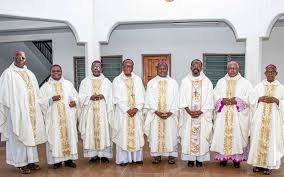Catholic Bishops in Togo have expressed concern about the change of the country’s Constitution that eliminates the presidential term limit.
In a statement issued, members of the Episcopal Conference of Togo (CET) warned that the removal of the Presidential term limit poses “a serious risk” to Togo’s national unity and endangers the “social cohesion” and stability of the West African nation.
The Togolese Parliament approved a constitutional amendment that introduced a parliamentary system of government. The amendment also created the role of the President of the Council of Ministers, who will have extensive authority to manage the Togo’s government affairs. Thus, under the amended Constitution, Togo’s President will no longer be elected by universal suffrage, but by legislators. This move gives room to President Gnassingbé to extend his 19-year rule.
This was almost sealed on May 3, when the President of Togo, Faure Gnassingbé, was appointed head of the Council of Ministers. It is a powerful new role with no term limits, Reuters reported.
In their statement, Togo’s Catholic Bishops weigh in on the appointment. “On May 3, 2025, our country officially moved from the Fourth to the Fifth Republic, in a context of deep tension, heavy hearts, and widespread frustration caused by precarious living conditions among the population.”
“This change, carried out without real national dialogue, has created misunderstandings and poses serious risk to Togo’s social cohesion and stability,” CET members lamented.
Togo’s Catholic Bishops recall that they “drew the attention of the Togolese authorities to the question of whether it was appropriate to change the Constitution of our country without genuine consultation of the sovereign people.”
“In a spirit of responsibility and peace, we called on the Head of State to refrain from promulgating the new Constitution adopted by the National Assembly at the end of its mandate. However, these appeals were not heeded,” they further lament.
The Catholic Church leaders have warned that the ongoing silence around the people’s concerns is dangerous. “The country is taking a risk by harbouring frustrations, for a nation cannot be sustainably built on imposed silence, on cultivated and maintained fear, on the contempt for the voice of its people, or on a stubborn insistence to make the people believe the opposite of the truth.”
“Silenced fears and frustrations turn into desperate actions, and unspoken anger becomes unpredictable explosions,” CET members warn.
They urged Togo’s political class to listen to the Holy Spirit and to the voice of the people. “May the authorities become aware of the growing malaise within the population; may the voice of the People be heard with respect and taken into account; may a process of reconciliation be initiated with discernment, through the holding of genuine, open, sincere, inclusive, and constructive dialogue,” Catholic Bishops in Togo appeal.
They acknowledge the patience and resilience of the Togolese but caution against confusing resilience with resignation. “Let us remember that true peace cannot be built without justice, truth, and sincere dialogue,” the Catholic Bishops emphasize. Hence, they urged all actors in national life, including the country’s politicians, civil society leaders, members of security agencies, and faith leaders to “work together to preserve the unity, peace, and future of our country.”
CET members invite all Catholics to “intensify prayers for justice, peace, dignity, and respect for the rights of all citizens.”
Additional Source: Reuters, Africa News




